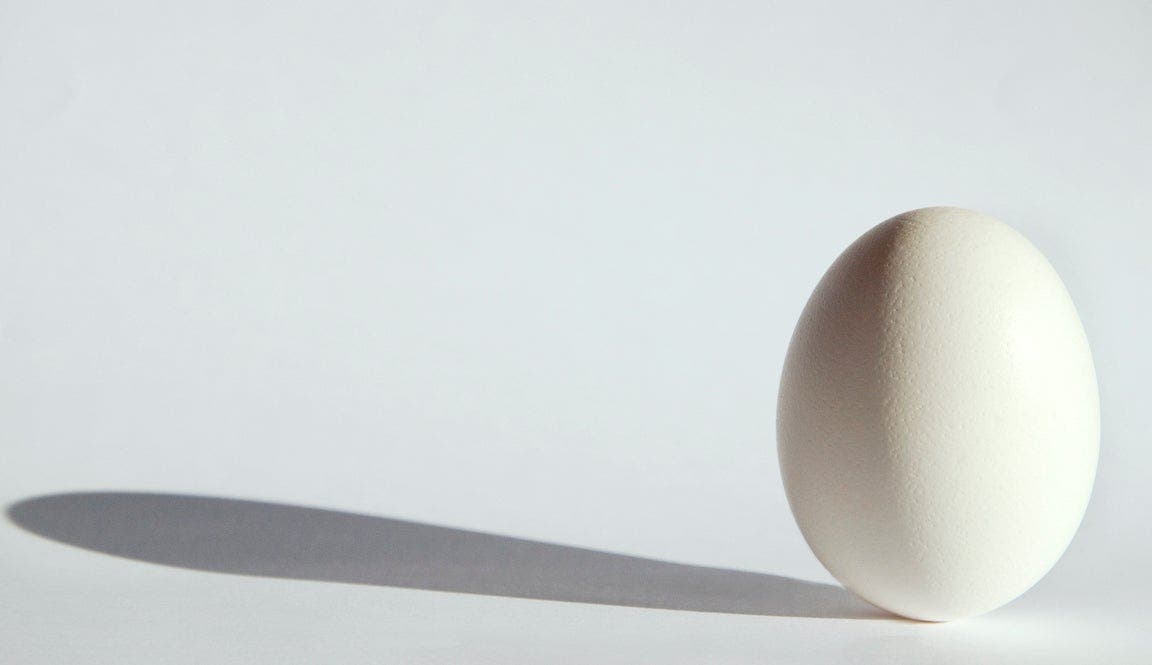Cracking the Great Egg Debate: Nutrition Friend or Foe?

Healthy breakfast
Nutrition studies are like a dubious party guest who says a thing to you one moment and then turns around and says the complete opposite to someone else. Chocolate, red wine, coffee, red meat, you name it and there seems to be a food or drink that has been both Dr. Jekyll and Mr. Hyde in research papers. One moment it’s extending our lives and the next it’s a health villain. But not much has created quite as much stir and oscillation between good and bad as the humble egg.
On an economic and nutritional level, eggs seem like a clear winner. They’re inexpensive — a dozen eggs are certainly a much cheaper protein than wild salmon or beef tenderloin — and they’re rich in some of the nutrients that runners need most. But what about all that cholesterol in those yolks that may gunk up our arteries? And it’s hard to ignore the multitude of studies that question their genuine healthfulness, or the dietary guidelines that recommend limiting your egg consumption or forgoing them altogether.
I can sympathize with those of you who feel jerked around. First eggs are bad, then good, then bad again. Observational studies and randomized trials have frustratingly reported contradictory findings on the association of egg consumption with human health, particularly for heart disease, still the number one killer in America in non-pandemic times.
So, should you chicken out on eating eggs? Let’s take a deep dive into the flip-flop world of egg research to see if we can figure out if you should be running towards or away from the egg aisle.
The Defense

Anyway you scramble it, eggs are nutrition-dense orbs. Hard-charging athletes should appreciate their first-rate protein – 6 to 7 grams in a large egg. The high-quality protein in eggs provides all of the essential amino acids our bodies need to build and maintain muscle mass. The quality of egg protein is so high that scientists frequently use them as the standard for evaluating the protein quality of other foods. A study in the American Journal of Clinical Nutrition found that males who consumed 18 grams of protein from whole eggs after a bout of resistance training had an uptick in their muscle protein synthesis rates which suggests a positive adaptation to training. Other nutritional highlights include vitamin B12, vitamin D, bone-benefiting phosphorus and selenium, a nutrient linked to improved mood. According to one report in Public Health Nutrition, egg consumers are more likely to meet daily requirements for several micronutrients without negatively impacting blood cholesterol numbers.
Eggs are also one of the few reliable sources of choline, a frequently under-consumed nutrient necessary for optimal brain functioning. Yes, some would say smart people eat eggs. Worth noting is that eating eggs can even increase our levels of important antioxidants like lutein that plays a role in maintaining eye health. Just keep in mind that most of this nutrition payload is located within the controversial yolks, so sizzle up an egg white omelet and you’ll largely miss out.
Of course, many people are worried about what impact a breakfast egg habit will have on their ticker. A few recent research papers may help put those concerns at ease. A large study in the American Journal of Clinical Nutrition involving about 177,000 individuals from dozens of countries of various income levels found that higher egg intake levels (≥7 eggs a week compared with <1 egg/wk intake) was not associated with worsening blood cholesterol or a higher risk for heart disease and premature death. A large prospective cohort study of more than half a million people from China reported that an average intake of 1 egg day was associated with an 11% lower risk of cardiovascular disease. And a comprehensive review of randomized trials and observational studies published in the European Journal of Clinical Nutrition found that an average daily intake of one egg did not raise the chances of developing heart disease or type 2 diabetes in healthy people or heart problems in those with diabetes as long as they were practicing healthy lifestyle habits like eating an overall nutritious diet. What’s more, the Health Professionals Follow-Up Study (37,851 subjects) and the Nurses’ Health Study (80,082 subjects) reported that consuming up to 1 egg daily did not increase the risk of coronary artery disease or stroke in healthy people. This meta-analysis of available research echoes these results. Finally, twice-weekly egg consumption was shown to not increase the amount of plaque in the arteries of adults of an average age of 57.
The main reason people have been warned about eggs is that they’re loaded with cholesterol.
One large egg contains roughly 200 milligrams of cholesterol, which is a lot compared to most other foods. But these study results suggest that we can consume this source of cholesterol in reasonable amounts without suffering heart woes. There is enough doubt about the role dietary cholesterol has on blood cholesterol levels and heart health that the U.S. Dietary Guidelines for Americans and American College of Cardiology have removed it as a substance of significant concern. In fact, some data is showing that egg consumption can change the LDL (“bad”) cholesterol in our system to a less harmful form and also increase the ability of HDL cholesterol to reverse transport cholesterol in our bodies which in theory would be heart-protective. It could come down to the nutrients and antioxidants present in eggs helping to counteract any deleterious effects of their cholesterol. Also, dietary phospholipids found within egg yolks have emerged as a potential source of bioactive lipids that may have widespread effects on pathways related to inflammation and cholesterol metabolism.
The Charges

Cue the controversy.
Recent research published in PLOS Medicine that garnered a fair amount of media attention linked egg consumption and dietary cholesterol to a higher risk of death from all causes including cardiovascular disease and cancer. The study used a food frequency questionnaire to gauge egg consumption patterns of 521,120 U.S. adults, average age of 62 years, and then evaluated how this intake relates to mortality throughout a 16-year follow-up. Since egg white intake was not linked to higher death rates from disease the researchers said it was likely the cholesterol found in eggs that accounted for a significant part of the higher mortality risks. So much for letting dietary cholesterol off the hook.
This meta-analysis of prospective cohort studies involving 106,000 people reported that people who consumed the most eggs (an average of 1 or more a day) had about a 25% higher risk of heart failure than those who ate the least amount of eggs. A recent pooled analysis from 6 prospective US cohorts showed a modest increase (2% in absolute risk) in all-cause mortality for each additional half an egg per day. And this research review that examined the association between various food groups and the risk for heart disease and stroke determined there was a small positive association for egg consumption and heart failure (in contrast, higher intakes of whole grains, vegetables, fruits, seafood and nuts were determined to be beneficial to heart health.) After assessing egg consumption every 2 to 4 years in more than 200,000 adults scientists in this American Journal of Clinical Nutrition investigation found that for each additional egg consumed daily there was a higher risk of developing type 2 diabetes in U.S. adults but for unknown reasons not people in Europe or Asia.
Many researchers have recommended restricting egg yolks because of their lofty cholesterol content, but perhaps there is another mechanism at play here concerning our health. Egg yolks contain lecithin and choline, two chemicals that are converted by some of the bacteria in our colon into a chemical called TriMethylAmine (TMA). TMA is then absorbed into our bloodstream and travels to the liver where it is converted to TriMethylAmine Oxide (TMAO). Too much TMAO may negatively impact health in a few different ways including increasing artery plaque formation and damaging DNA in our cells. But how many eggs you would need to eat to raise TMAO to potentially dangerous levels is unknown.
So… what is the final verdict on eggs?

All right, so all of this still doesn’t answer the key question. Are eggs good or bad for you, once and for all?
The unsatisfying answer is that nobody really knows for sure whether or not eating eggs is safe or not. The only foolproof way we would get a definitive answer is if we isolated a bunch of people for several years and fed them the same diets with the exception of eggs and then tracked their health progress. For obvious reasons, this is not feasible.
So we are left looking at epidemiological observational studies which cannot ascertain a cause and effect when it comes to eggs and disease outcomes like diabetes and heart disease. Perhaps people who eat a lot of eggs typically practice some less desirable lifestyle habits like eating few vegetables and exercising less. It is certainly possible that the health effects of eggs could depend on the background diet. And is the cholesterol from eggs more or less harmful than cholesterol from other sources like red meat? Eggs account for only 25% of the cholesterol in the typical diet. So if dietary cholesterol is still a concern for your personal health but you don’t eat meat or dairy, perhaps then you can eat more eggs without worry. Many studies rely on food frequency questionnaires to assess egg consumption patterns and these surveys are notorious for some degree of measurement error. What we are essentially left with is a vague conclusion that a food like eggs can bring about a person’s untimely demise, or, alternatively, help with longevity.
The reason for the different results from different studies is not known. Possible factors include the play of chance, methodological differences or selection biases that led to the inclusion of some studies but not others in the analyses. Who funds a certain study can, sadly, also impact the results. Demographics may also play a role – differing dietary and lifestyle habits may make U.S. adults more prone to adverse health outcomes from eating eggs than people in Europe or China. If a research review included more older people with or at risk for certain chronic diseases it may produce a less desirable outcome for eggs than a review study that focused on a younger, healthier demographic. The effects of egg consumption may also vary across populations with varying diet quality (such as a low- or high-carbohydrate diet). There’s always going to be individual variations (hello, genetics), so it’s hard to make a sweeping statement.
You also have to look at egg consumption not in isolation but as part of the whole diet. If you eat a well-balanced diet full of healthy stuff like vegetables and whole grains then it’s reasonable to assume that any risk of cracking open an egg is reduced. But serve up cheese omelet’s with a side of greasy sausage too often and the health risks may shoot up. Remember, nobody eats one food in isolation. It’s likely that the right amount of eggs for you is dependent on the rest of your diet.
And if you are eating eggs what are you eating less of? One could argue that a hard-boiled egg for breakfast is a better choice than a bowl of sugary cereal or pancakes doused in syrup. (Sugar and other refined carbohydrates may put people at higher risk for heart attacks, diabetes and premature death than eating cholesterol and TMAO from eggs and meat.) Or that a frittata is a better protein choice for dinner than a greasy burger. But a fried egg may not be as heart-healthy as a bowl of unsweetened steel-cut oats topped with berries. In one study, 30 overweight or obese women consumed a breakfast of either eggs or white flour bagels with both meals containing the same amount of calories. The women in the egg group felt more full and ate fewer calories for the rest of the day and for the next 36 hours.
What’s more, how people in a study typically prepare their eggs may play a role in health outcomes. When cooked or processed in direct contact with high-heats the cholesterol within eggs can become oxidized, and oxidized cholesterol might contribute to heart disease progression. So consuming more hard-boiled or poached eggs may be more ticker-friendly than if eggs are frequently consumed fried or baked. With these latter methods, you also have to consider the excess calories in using oils or butter.
Still, we can glean a few tidbits from the available research. If you are a healthy runner without heart problems or diabetes you can likely consume an average of an egg a day with little worry, and maybe even more if you eat mainly a whole-foods based diet. The nutrients and protein that the orbs provide can help meet the heightened nutrition needs of training. (Remember, there are several nutrients in the egg yolk that you’re not going to find if you just have egg whites.) This is not to suggest that it’s a good idea to be eating half a dozen eggs every day no matter how many miles you are logging. For those with diagnosed heart problems or diabetes, or at high-risk for these conditions, the available evidence suggests it might be wise to trim intake to a couple of eggs a week or less.
What can be said for certain is that, if possible, you want to scramble up eggs that were dropped from free-roaming hens. A side-by-side comparison of eggs from pasture-fed chickens and those confined to the indoors and fed grains by investigators at Pennsylvania State University found the former were much higher in important nutrients including omega-3 fatty acids, vitamin E and vitamin A. Egg carton labels like ‘cage-free’ and ‘free-range’ are nebulous so to make sure you are getting what you pay for you’ll need to research a brand such as Utopihen Farms or your local farmer to figure out if their eggs do indeed come from birds who get to peck away at grubs in the great outdoors.